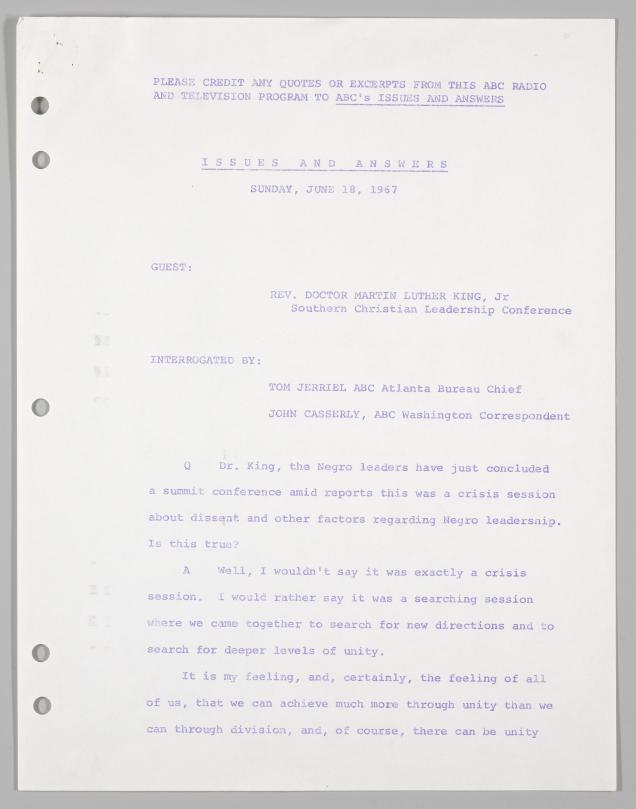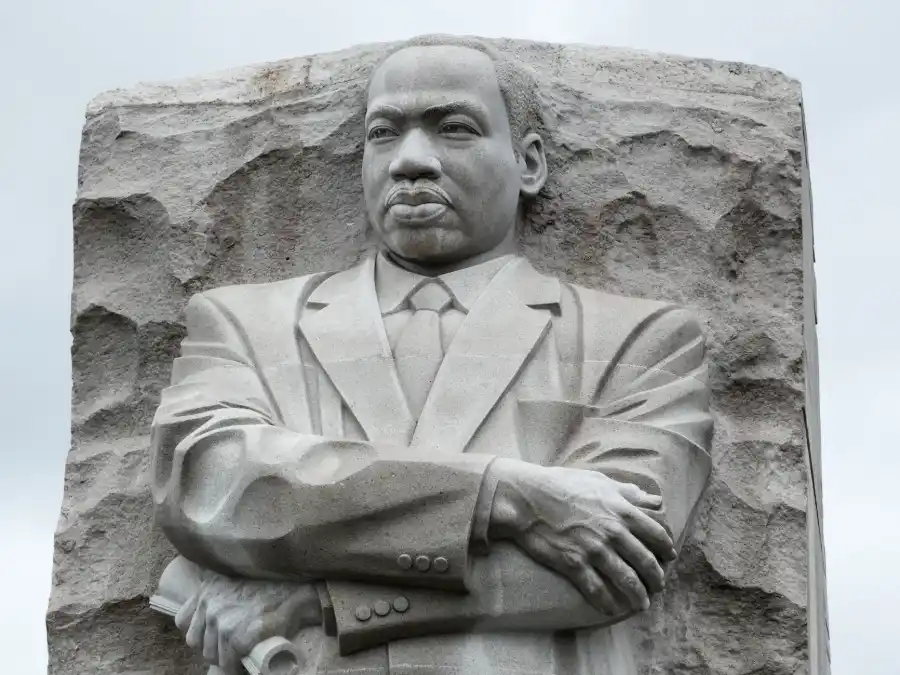
Excerpt from Martin Luther King’s interview on ABC’s Issues and Answers, Sunday, June 18, 1967. Interviewed by Tom Jerriel (ABC Atlanta bureau chief) and John Casserly (ABC Washington correspondent). From the transcript, following a discussion of the Vietnam war.
Q: Let’s go to the other war for a moment, Dr. King. What are your views as a Nobel Peace Prize winner on the complex situation in the Middle East?
A: Well, it is certainly a very complex situation. I think first that we must work passionately and unrelentingly through the United Nations to try to grapple with this years-old problem in the Middle East. I would hope that the Middle East will not become an arena for power politics, whether we refer to Soviet Russia here, or the United States of America. We have got to achieve peace in the Middle East and in the Middle East achieving peace means two things.
Peace for Israel means security. The world and all people of good will must respect the territorial integrity of Israel. We must see Israel’s right to exist and always go out of the way to protect that right to exist. We must also see that Israel is there and any talk of driving the Jews into the Mediterranean, as we have heard over the last few weeks or the last several years, is not only unrealistic talk but it is suicidal talk for the whole world and I think also it is terribly immoral. We must see what Israel has done for the world. It is a marvelous demonstration of what people together in unity and with determination, rugged determination, can do in transforming almost a desert into an oasis.
But the other side is this, that peace in the Middle East means something else. It means for the Arabs development. After all the Arab world is that third world, a part of that third world of poverty and illiteracy and disease and it is time now to have a Marshall Plan for the Middle East. I think this is going to be finally the only answer. So long as people are poor, so long as they find themselves on the outskirts of hope, they are going to make intemperate remarks. They are going to keep the war psychosis alive. And what we need to do now is to go all out to develop the underdeveloped, and we must see that there is a grave refugee problem that the Arabs have on their hands and the United Nations through all of the nations of the world must grapple very constructively and forthrightly with these problems.
Q: Should Israel in your opinion give back the land she has taken in conflict without certain guarantees, such as security?
A: Well, I think these guarantees should all be worked out by the United Nations. I would hope that all of the nations, and particularly the Soviet Union and the United States, and I would say France and Great Britain, these four powers can really determine how that situation is going.
I think the Israelis will have to have access to the Gulf of Aqaba. I mean the very survival of Israel may well depend on access to not only the Suez Canal, but the Gulf and the Strait of Tiran. These things are very important. But I think for the ultimate peace and security of the situation it will probably be necessary for Israel to give up this conquered territory because to hold on to it will only exacerbate the tensions and deepen the bitterness of the Arabs.
Q: But Israel indicates, Dr. King, that for its own security it should keep certain territory, particularly in Syria, the approaches to Israel, in order to maintain its own security.
A: Well, there again I am putting my hope in the United Nations. And I know the United Nations will not be effective if these major powers will not cooperate with it, so I am hoping that they will cooperate with it and that the UN itself will place a peacekeeping force there, so that neither of these forces, whether it is the Israeli forces or the Arab forces, will continue to engage in these brutal battles. And the other thing, I think there is a great need for greater disarmament, not only in the Middle East but all over the world.

More Reading
For the context of this interview and King’s attitudes to the conflict, see the following by Martin Kramer:
In the Words of Martin Luther King

You must be logged in to post a comment.